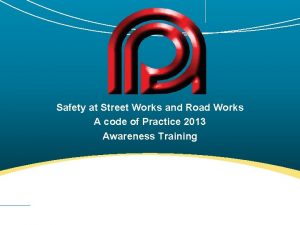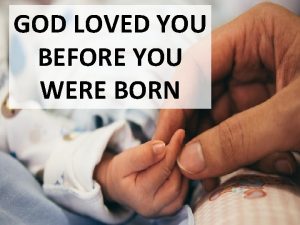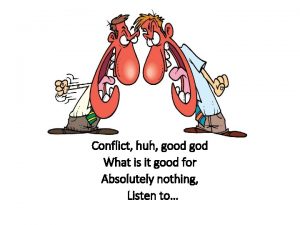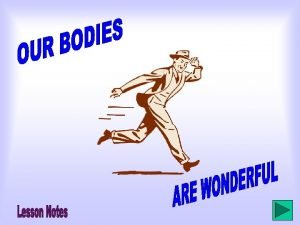God Works In You Phil 2 13 Phil


















- Slides: 18

God Works In You Phil. 2: 13

Phil. 1: 6 • Be sure, certain. Paul’s confidence: 5 -6. . . – God began working on you (salvation) – God continued working on you (growth) – We are confident He will finish This is not careless presumption: Ph. 2: 12; Ga. 5: 4

Phil. 1: 6 Wrongly assumes his ‘salvation’ (faith alone) matches NT model. Ph. 1: 6, cannot be lost? ? 1. 7: Paul confident (ASV); feels (NASB); thinks (NKJV) this about them. 2. 10: he prays for their salvation. Why? 3. 25: Paul’s confidence—he will stay alive: what is likely to happen, not certainty. Paul knows God will do His part. He helps Philippians do theirs.

I. What Does God Want Us To Do?

1. Live worthy of the gospel, 1: 27 • Worthy: axiom, axiomatic (self-evident) • Walk worthy: walk the walk – Prison epistles teach us to walk – Philippians, to behave as citizens • Roman colony, Ac. 16: 12 • ‘Your citizen life’ – Ph. 3: 20; Hb. 12: 22 • Inconsistent Christians hinder gospel; Mt. 23: 27 -28

2. World is hostile to faith, 1: 28 -30 • Inconsistencies of world • World hates the Bible

3. Love, 2: 1 -11 1: love, unity, compassion 2: joy, unity, love 3: united, respectful, humble 4: concern for others 5 -11: example of Lord

4. Watch ourselves, 2: 12 -18 12: always 1 obeyed. . . 2 work out own salvation ? • NOT that we decide what we want to do, Ac. 9: 6 • NOT that we merit salvation by works • BUT ‘make every effort to obtain salvation’ (Th). 3: 1 -11, 15

4. Watch ourselves, 2: 12 -18 12: always 1 obeyed. . . 2 work out own salvation ? 13: why this exhortation (12): God is at work in you • Energize, be at work, active. • 1: 6, God working in them

4. Watch ourselves, 2: 12 -18 12: always 1 obeyed. . . 2 work out own salvation ? 13: God is at work in you. . . ATR: “He exhorts as if he were an Arminian in addressing men. He prays as if he were a Calvinist in addressing God and feels no inconsistency in the two attitudes. ” To will: self-determination. Josh. 24: 15 To work: personal exertion.

I. What Does God Want Us To Do? II. How Does God Work In Us?

1. Through His word, 1 Th. 2: 13 (= Ph. 2: 13) • It’s not Paul’s message, but God’s. • Philosophical systems competed with gospel (Col. 2); pressure to compromise. – Gospel came to Thessalonica (2: 13) – 1) Recognized the word (from God) 2) Received 3) Relied word (through Paul) on word (believed, obeyed)

1. Through His word, 1 Th. 2: 13 (Ph. 2: 13) • Power of God’s word in us – – 1: 9, makeover: turned to God, from idols – 2: 10, trains us (schooling; showing) – 2: 13, works in us (= Ph. 2: 13; Ga. 5: 6) 2 K. 22: 8…Josiah’s reforms Was God at work? How? Ac. 2: 14… 38 -41, 42 Was God at work? How?

1. Through His word, 1 Th. 2: 13 (Ph. 2: 13) • Power of God’s word in us – – 1: 9, makeover: turned to God, from idols – 2: 10, trains us (schooling; showing) – 2: 13, works in us (= Ph. 2: 13; Ga. 5: 6) – 2: 16, saves – 3: 2 -3, strengthens – 4: 18, encourages – ultimate good news

2. Through human agents, 2 Co. 1 • 3: most question God when they suffer. How many thank Him? • 4: suffering is a training ground. – Sufferers learn to help others, 7: 4 -7 – Not deliverance from trouble, but encouragement in it, 1: 4 • 5: sufferings for Him are His sufferings, Ac. 9: 5

2. Through human agents, 2 Co. 1 • 6 -7: Paul suffered; Corinthians benefit. – Satan’s fires do He notlets destroy a church, His people sink but strengthenwhere it. no human arm can – Those who think they arewhen strong, often reach them; delivered fall. (Mt. 26) they praise Him, not – Those who trust Godthemselves share in God’s comfort (Ac. 12) • Which Peter are we? • 8 -9: Paul’s near-death experience (like a resurrection from the dead)

2. Through human agents, 2 Co. 1 • 10 -11: each enters trials. We learn to. . . – Pray for one another. – Trust God. Path begins in pain, ends in praise.

3. Providence • Individuals, Mt. 6: … 33 • Undivided loyalty to God promises “all these things” that Gentiles worry about (32)
 O god you are my god earnestly i seek you
O god you are my god earnestly i seek you Safety at street works
Safety at street works In all things god works
In all things god works God loved you before you were born
God loved you before you were born If i could only teach you one thing why god made you
If i could only teach you one thing why god made you You who love the lord hate evil
You who love the lord hate evil Work present simple or continuous
Work present simple or continuous Our god is an awesome god vine
Our god is an awesome god vine Our god is an awesome god he reigns
Our god is an awesome god he reigns Our god is an awesome god medley
Our god is an awesome god medley God is good god is great speed
God is good god is great speed God-given virtues that direct us to our loving, triune god.
God-given virtues that direct us to our loving, triune god. Justice new testament
Justice new testament My god's bigger than your god
My god's bigger than your god You say you love the rain
You say you love the rain You are what you eat do you agree or disagree
You are what you eat do you agree or disagree If you think you can you can poem
If you think you can you can poem Tell me what you eat and i shall tell you what you are
Tell me what you eat and i shall tell you what you are I will follow you wherever he may go
I will follow you wherever he may go


































